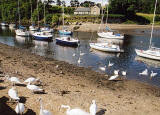|
Edinburgh Today Cramond Ferry |
||||||
|
River Almond Cramond is now a popular sailing location. The village lies beside the Firth of Forth in the western suburbs of Edinburgh, about five miles to the west of the centre of the City. There has been a small ferry crossing across the River Almond at Cramond since the mid-1800s, except for a few short periods when it has not operated - the 'war' years, periods of ill health and recent years. (See below.) The ferry has provided a crossing, taking walkers from the eastern bank of the River Almond at Cramond across the river onto the Dalmeny estate, through which there was a five-mile walk beside the Firth of Forth to the Forth Rail Bridge at South Queensferry. |
||||||
|
The Ferryman The ferryman's house is on the western bank of the Almond, seen in the photograph above. From here he looks across the Almond to see if there are any waiting customers. The ferry was propelled and steered with a large oar at its stern. Here are two reports of of Mr Badura who was ferry man for most of the second half of the 20th century. I don't know which report is the more accurate, but the second certainly gives more background information.
Today (May 2005) the ferry is still not operating, and there has been talk of a footbridge being built further up the Almond to replace the ferry.
|
||||||
|
The Roman Lion A later ferryman, Robert Graham, discovered a large stone Roman figure of a lioness devouring the head of a man, thought to be a funeral ornament, just below the water close to the ferry landing stage. The lioness was removed from the mud and is now on display at the National Museum of Scotland, Chamber Street, Edinburgh. The Romans are believed to have settled in Cramond around 140AD and again 208-212AD. The remains of a Roman fort can be seen in the grounds of Cramond Kirk.
|
||||||
|
Ferry closed For how long? Restrictions established to contain the foot-and-mouth outbreak amongst Britain's cattle caused the ferry crossing to be closed in 2000. The restrictions were subsequently lifted but the jetty was declared unsafe and ferry has remained closed. Speculation continues on whether and when the ferry service might open again. Planning permission has been granted to re-establish the service and a grant has been offered by Scottish National Heritage, but the Forth Estuary Forum and the Dalmeny Estate are still discussing what form of crossing to create. Edinburgh Evening News 5 October 2004, p.17 |
||||||
|
Bridge For almost six years now (February 2006), the Cramond Ferry has been closed. Access to the Earl of Rosebery's Dalmeny estate on the opposite bank of the narrow River Almond entails a 3 mile walk to cross the River Almond further upstream at Cramond Brig. However, a feasibility study is now to be undertaken into replacing the ferry by a bridge, built over the Almond upstream from the existing moorings at Cramond. This study is to be co-ordinated by the Forth Estuary Forum and will also involve representatives from Dalmeny Estate and local groups. The cycling and walking charity, Sustrans, is reported to be currently working with Dalmeny Estates to establish a network of paths for walkers and cyclists in the estate. Edinburgh Evening News February 16, 2006, p.23 |
||||||
|
Proposed Bridge The Cycling Edinburgh web site now includes a map and details of a proposed 30-metre bridge for pedestrians and cyclists across the River Almond, a short distance upstream from the former ferry at Cramond. This would avoid a 3-mile detour to cross the river at Cramond. These plans have been drawn up by SEStran (SE of Scotland Transport Partnership) with the help of JMP Consulting. The Cycling Edinburgh web site also includes a section for people to give their responses to the proposed bridge. November 12, 2007 |
||||||
|
Objections to a Bridge Lord Rosebery owns the land on the west bank of the River Almond at Cramond. His agreement is needed before a bridge can be built across the river at Cramond. However, he has objected, claiming that the proposed bridge would "attract an unsavoury crowd to his estate". He expressed his concern over litter, lighting fires, uncontrolled dogs, motor cyclists and violent behaviour by groups of youths. The Cramond Community Council and Cramond Heritage Trust have expressed disappointment over the views expressed by Lord Rosebery. Support for another Ferry However, Lord Rosebery said that he would support a ferry across the river, provided that it was paid for and managed by another body. Edinburgh Evening News December 6, 2007 |
||||||
|
A chain ferry has been suggested for the crossing at Cramond to replace the old rowing boat that operated until 2000, when it closed due to the foot-and-mouth outbreak and a crumbling jetty. Lord Rosebery, owner of the estate on the west side of the Almond, has objected to a bridge being built across the Almond on the grounds that it would "attract an unsavoury crowd to his land". However, he says he would have no objection to a chain ferry. A chain ferry would be guided by chains linked to both shores of the Almond. A ferry operator would operate it by cranking a handle. It would operate during the day, but not night, and would be able to accommodate up to 12 people. It would also be able to take a wheelchair. It would be likely to cost about £250,000, but Phil Wheeler, Edinburgh Council transport leader has said that the council would not be able to provide any funding for it. Edinburgh Evening News September 26, 2008 |
|
TRANSPORT |
|||||||
| Full Index |
Bus Tickets |
Railway Tickets |
|||||


